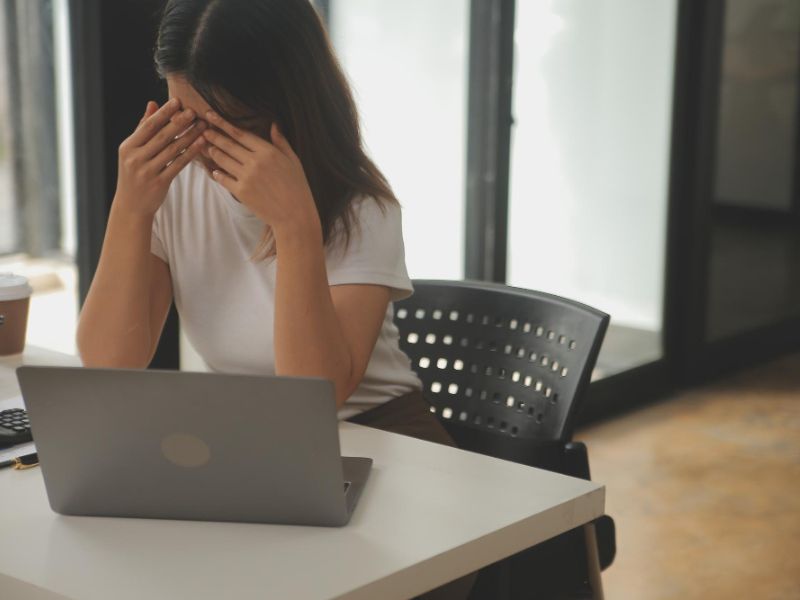Under normal circumstances, stress at work can be difficult to avoid, especially if you are stuck behind a desk, whether that be in the office or at home.
But, in these unprecedented times of global pandemic, the vast majority of people who are normally office-based will be trying to work remotely, in a new and hastily contrived workspace.
Many employees, across a range of professions, will already be used to working remotely and will be able to cope with the challenges that come with it, but for some, this will be their first time working from home and they may find the experience more difficult.
Typically, when working from home, people may feel more stressed and anxious because of the increase in social isolation, lack of structure and the feeling of being unable to “switch off”.
According to a 2017 United Nations report, 41 per cent of remote workers reported higher stress levels, compared to 25 per cent of office workers.
Stress is the body’s way of protecting you from danger or a threat, and if managed properly moderate stress can even help people achieve goals. However, if left to build-up, stress can trigger mental health conditions such as depression and anxiety.
Priory expert Steve Clarke, a psychotherapist and hospital director at the Priory’s Life Works Hospital in Woking, Surrey, explains some steps that people can take to try to manage their own stress at home:
Emotional Freedom Technique (EFT)
Repetitive finger tapping can sometimes help to release negative emotions such as anxiety. It has been called a psychological version of acupuncture in that it involves making contact with a number of acupuncture points. The specific points to tap are the end-points of the major meridians (meridians are believed to be channels of subtle energy which flow through our body). So, whilst focusing on your negative emotion you tap on a ‘meridian’ point (collarbone, under the arm and top of the head) three to seven times, repeating your negative thought in your head. After each emotion, take a deep breath and exhale. Continue this until you feel calmer and relieved. When you feel more relieved, repeat the technique whilst you tap through a “positive round”, repeating more uplifting phrases.
Guided meditation apps
Many apps such as Headspace or Calm offer different types of meditation for different concerns, or simply basic meditation. These typically offer meditation as short as three minutes and up to 20-minute sessions.
Progressive Muscle Relaxation
This can also be done at any time during the day. PMR involves tensing and releasing muscles in certain intervals. There are guided versions available online for free on YouTube.
Deep breathing
Take a long deep breath while counting for five-eight seconds, then hold it for five-eight seconds. Repeat several times to relieve anxious/stressed feelings. This can help re-centre you during a busy work day.
Eat healthily
Avoid comfort eating and instead choose food that increases your energy and gives you sustainable nutrients to get you through the day.
Preparation is key to stress prevention
Even without the rhythm and routine of the daily commute and the familiarities of office life, continue to plan out your week or day ahead and create a checklist of things that need to be completed by priority. Give yourself enough time to complete each task and schedule regular breaks to avoid burnout. Reward yourself for completing tasks, even if it’s as simple as crossing it off the checklist.
Changing a difficult situation isn’t always possible.
So, accept what you cannot change and focus on the things you do have control over – such as regularly connecting with colleagues over video conferencing or online meetings.
Put on headphones to listen to music can have many benefits
These include helping you relax and focus on something away from work and the ‘outside world’. Try to turn off rolling news and social media platforms such as Twitter. It can be tempting to tune in to endless updates whilst working alone, away from colleagues – particularly in the ever-changing news environment – but this can be very distracting, filling your positive head space with negative and distressing news.
Stretch your legs and take a walk
Even just to the garden, the kitchen or another room in your house before returning to your desk. Moving around and changing your environment, even slightly, can clear your mind and re-energise you.
Employment Assistance Programmes
Employment Assistance Programmes are employer-funded workplace wellbeing and counselling services that offer employees confidential counselling and advice on a wide range of work and personal issues. It is free to employees. Some EAP programmes, like those offered by Care First, offer 24/7 access to mental health chatbot programmes and use online therapy and crisis texting programmes as well as phone support. There are also paid-for alternatives, which also allow you to practice social distancing or quarantine restrictions while accessing a trained therapist and can be extremely useful in periods of acute stress. The Priory Group offers a paid-for platform for this called Priory Connect which might be available through your health insurance company.









